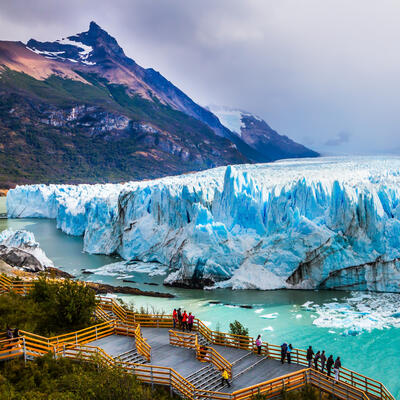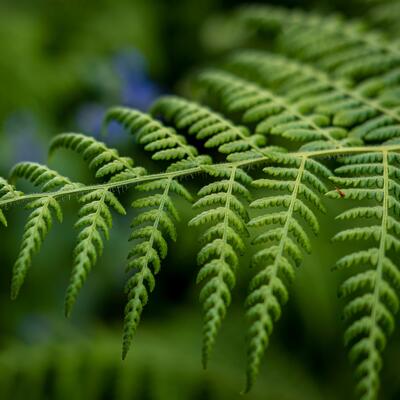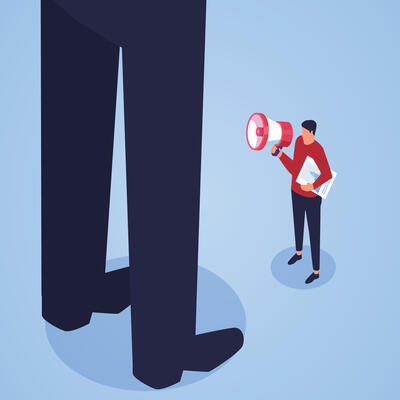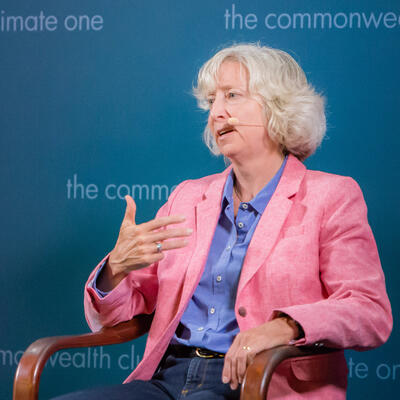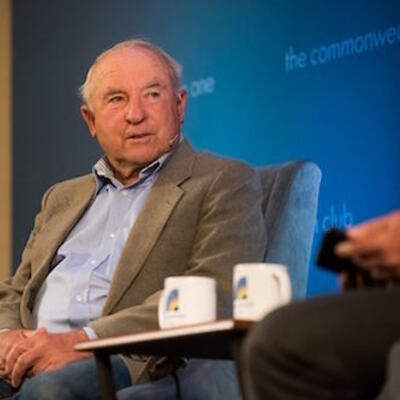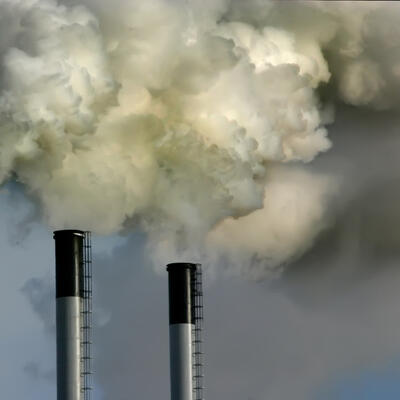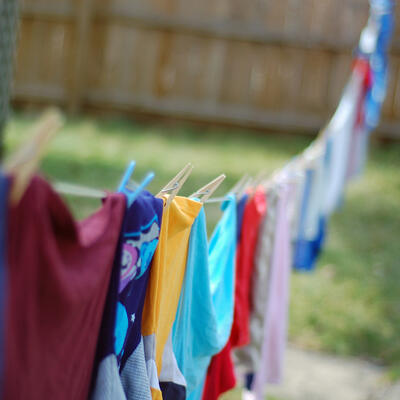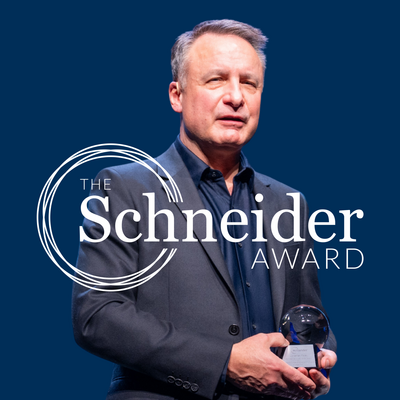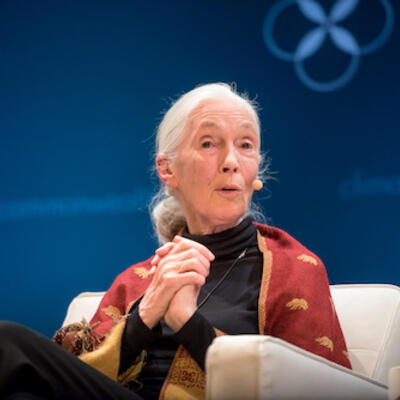
Jane Goodall and Yvon Chouinard
Summary
World-renowned primatologist and conservationist Jane Goodall talks about her life’s work, the link between deforestation and climate change and why she sees reasons for hope. Yvon Chouinard, the reluctant entrepreneur who founded Patagonia, Inc., explains how charting his own path through the wilderness led him to create a multi-million dollar sporting goods company committed to environmentally responsible design and production.
Jane Goodall, Founder, Jane Goodall Institute; U.N. Messenger of Peace
Yvon Chouinard, Founder, Patagonia, Inc.
This program was recorded by the Commonwealth Club of California.
Full Transcript
Announcer: This is Climate One, changing the conversation about energy, economy and the environment.
Jane Goodall: We haven't inherited this planet from our parents, we borrowed it from our children, and we’ve got to get together and do something about it if we care about our children and our grandchildren.
Announcer: That’s world-renowned primatologist, anthropologist and environmentalist Jane Goodall. At the age of 83, she’s lost none of her passion for nature and optimism for humanity. Goodall is the subject of a new National Geographic documentary, which draws on over a hundred hours of never-before-seen footage that has been tucked away in their archives for over fifty years.
And we’ll revisit our interview with another legendary conservationist: Yvon Chouinard, the reluctant entrepreneur who founded Patagonia.
Yvon Chouinard: In our mission statement is, ‘cause no unnecessary harm.’ Well, I want to go beyond that, I want to do good.
Announcer: Jane Goodall and Yvon Chouinard. Up next on Climate One.
Announcer: Welcome to Climate One – changing the conversation about America’s energy, economy and environment. Climate One conversations – with oil companies and environmentalists, Republicans and Democrats – are recorded before a live audience and hosted by Greg Dalton.
Today, we’ll hear from two legends of conservation, both of whom have gone to extremes to help us better understand the natural world and how to protect it.
When Jane Goodall was a child her father gave her a stuffed chimpanzee doll named Jubilee. At the age of 26, she went with her mother to study chimpanzees in Gombe Stream National Park on the coast of what is now Tanzania. She had no college degree and no field experience. She later earned a PhD at Oxford and became famous around the world as a pioneering scientist and the foremost expert on our chimp cousins. Today, as a United Nations messenger of peace, Goodall travels the globe sharing her vision for a healthy balance between people, animals and the environment. Here’s Greg Dalton:
Greg Dalton: Dr. Goodall you travel the world 300 days a year and recently at one point you were in Greenland and you had an encounter about climate change. Share with us that moment.
Jane Goodall: Well, it was really when the reality of climate change kind of viscerally hit me because I was with some of the Inuit elders and we were by the great ice cap, and they were crying and they were saying even in the summer the ice here never melted. And there was just water pouring out of this great ice cliff and the icebergs were carving and it was really, you know, and then I happened to be going straight from there to Panama and there I met some of the indigenous people who'd already been moved off their islands because of the melting ice; the sea levels were already rising and they’d had to leave because at high tide their homes were endangered. And that just hit me from one to the other as though the fates had taken me from this place to that place to see A, what was happening and B, the effect it was having.
Greg Dalton: So you knew about climate change before but being there in that moment with those people made it different, it got to your heart in a way that knowledge didn't.
Jane Goodall: Exactly, sometimes it just really hits you.
Greg Dalton: And what have you done with that that impact?
Jane Goodall: Well, first of all learning all that I can about it and reading some of the scientists’ reports, and travelling around and then all the lectures I give and I don't know how many hundreds per year all over the world. I talk about it, you know. It's not the main topic of my lectures but it's something that I always bring in as the greatest threat that we face right now.
Greg Dalton: Jane Goodall, diet is a big lever when it comes to climate. Some people say what you eat is more important than what you drive. What is your diet like and how can people who are concerned about climate have a climate-smart diet?
Jane Goodall: Well, glad you asked that question because I was determined to talk about it even if you didn’t.
[Laughter]
So I think from about the late 60s I stopped eating meat. Now, I stopped eating meat because I learned about the intensive animal agriculture and these terrible factory farms. Next time I looked at meat on my plate I thought this symbolizes fear, pain and death. So I stopped eating it. Then I began to realize a lot more that as nations around the world become wealthier, they eat more and more meat. It becomes a status symbol. And so what's happening is these billions of animals in these awful conditions, they have to be fed, rainforests are being cut down to provide the grain, huge amounts of fossil fuels are burned getting the grain to the animals, the animals to the abattoir, the meat to the table. Huge amounts of water are being wasted to change vegetable protein to animal protein. I've been in many parts of the world where the grazing of cattle moving deeper and deeper and deeper into the forest, change it to woodland and eventually into some kind of inhospitable habitat which wouldn’t support life.
And then, you know, if people don't care about animal welfare, okay, they don’t care about the environment, okay. They probably care about their own health and I happened to be in the U.K. when the surgeon general made this chilling announcement that the era of the antibiotics is nearly over and a main contribution is the misuse of antibiotics keeping these animals alive. And then the final thing which impacts directly onto climate change and these so-called greenhouse gases that circle the planet and trap the heat of the sun. You know, a very vicious greenhouse gas is methane and I usually carry around with me a little stuffed toy, a cow, and I point out especially to the children that, you know, you hold up the cow, food goes in the mouth and gas comes out the end and that’s methane. And so the intensive animal husbandry is causing a huge, huge amount of production of methane.
Greg Dalton: You write a lot about empathy and I’d like to know, you know, empathy for the chimpanzees that you studied, can you summon empathy for poachers and people doing environmental degradation?
Jane Goodall: I absolutely, you know, it depends. There’s poachers and poachers. If we’re talking about the international animal trafficking where people come in with helicopters and, you know, machine guns and kill elephants for their ivory, no sympathy, none at all. However, having seen for myself the poverty in Africa in and around the rainforests where the chimpanzees live that we’re trying to protect, you know, if you’re very poor you’re going to kill an animal because you need to eat it and you don't have money to buy anywhere else. And if that animal happens to be in a protected area then you’re labeled a poacher. If you happen to be out of a protected area, it's called subsistence hunting. And so, you know, but this goes beyond that simple we got to kill to eat. And it -- when I flew over Gombe National Park in 1991 and looked down on this tiny 30 square miles of forest, which used to be part of the great forest belt, and saw that it was surrounded by completely bare hills with more people living there than the land could support, too poor to buy food from elsewhere and living and struggling to survive and that's when it hit me we can’t even try to save the chimps in the forest unless these people can have better lives, because if you’re starving, of course you cut down the last trees to try and grow food or to make charcoal. And it's the same thing. This necessity to alleviate poverty comes right through into the developed world, because if you are very poor in an urban area, you’re going to buy these very cheap foods because you have to, you’ve got to feed your family, you can't afford to look and buy the expensive organic products or the ones that come from, you know, palm oil-free products. So alleviating poverty to me is a very, very important part of slowing down climate change.
Greg Dalton: Let’s talk about some of the bright spots. Climate change is often seen as doom and gloom, there is a lot of alarming things happening, it's here, it's now. But Jane Goodall, you travel the world, where are some really bright spots that you see where positive change is happen?
Jane Goodall: Well, of course, I can't resist saying that we’re having this long discussion about climate change, but it's a hoax, it was invented by the Chinese right?
[Laughter]
So I don’t know why you have this program at all, but anyway.
Greg Dalton: So we should just talk about something else.
Jane Goodall: No, there are a lot of bright spots. This is it. I mean, people say Jane you can’t really have hope because you’ve been around, you’ve seen the destruction of the forest, you’ve seen animal species decreasing in number, you’ve seen the poverty and, you know, all the rest of it. But at the same time, I’ve seen incredible projects, I’ve met the most amazing people who are doing things to really make change, and we do need changed attitudes. But I described flying over Gombe and seeing 30 square miles of forest surrounded by bare hills because we began working with Jane Goodall Institute with the local people to improve their lives in a holistic way. There are no bare hills anymore. The trees have come back and the chimpanzees have now more forest than they had and we’re protecting other areas where the forest hasn't yet been cut down. So this is one bright spot, that bright spark that you're talking about. But, you know, travel around the world and see the incredible advances that are being made in ways of living in harmony rather than destroying nature, listening to nature, biodynamic farming, organic farming, small-scale family farming. Even the United Nations have said the best way to feed the growing population is small-scale family farming, not these monocultures, and please let’s eliminate genetically modified food. Let's eliminate some of these chemical pesticides, herbicides and fungicides that are being proven to be harmful not only to the environment but to our health, our children. You’ll hear, we haven't inherited this planet from our parents, we borrowed it from our children, we haven't borrowed our children's future. We've stolen it and we’re still stealing it and we’ve got to get together and do something about it if we care about our children and our grandchildren.
[Applause]
Greg Dalton: And speaking of children you have some thoughts about population as a driver beneath all of these things that we’re talking about. What should be done about population?
Jane Goodall: For a long time it was considered politically incorrect to even mention it and most of the big conservation organizations refused to mention it. But I always thought, I mean, you see what happens. In the old days, there were cultures and a lot of these indigenous people and you had lots of children because they looked after you in your old age and you shared out the land. But now it's different and they know it's different. And that's why there were bare hills all around Gombe. So we've introduced in our program, we’ve introduced family planning so welcomed by the people because they know that things are different. And of course, this administration is cutting family planning around the developing world which is terrifying to me. And so if you approach family planning right, it’s something that's very, very important. And when it was considered politically incorrect to mention it and I was determined to mention it, I decided to call it voluntary population optimization.
[Laughter]
So by the time people worked it out --
[Applause]
Greg Dalton: And research shows educating girls is one of the smartest things --
Jane Goodall: Yeah, I meant to say that, yes indeed. Women's education, empowering women and scholarships to keep girls in school beyond puberty. Family size then tends to drop worldwide, indeed.
Announcer: You’re listening to a Climate One conversation with primatologist and UN Messenger of Peace, Jane Goodall. We’ll be back with more, right after this.
Announcer: Today on Climate One, Greg Dalton is talking with Jane Goodall. Her pioneering work with chimpanzees challenged the male-dominated scientific consensus of her time, revolutionized our understanding of the natural world, and inspired generations of young women to pursue their passion for science.
Greg Dalton: Jane Goodall, as a pioneer in science who broke some glass ceilings, what advice do you have about girls who are interested in science, technology, engineering, math, STEM careers?
Jane Goodall: I think -- I always tell young people what my mother told me when I wanted to go to Africa and live with wild animals and write books about them when I was 10 years old. Everybody laughed at me and said, well you don't have the money, Africa is far away, the world is -- World War II is raging and you're just a girl. Dream about something you can achieve. But what my mother said to me was, if you really want to do something you’ve got to work very hard, take advantage of opportunity and never give up. So what I tell girls who want to pursue some career in science, it's not that easy and you’ve got to really want to do it. If you really want to do it, just go for it, work hard and never give up.
Greg Dalton: Pretty good advice.
[Applause]
And we have a number of children in the audience here today. We’re talking about a very serious topic climate change. Oftentimes, it’s delicate to talk about climate change with children. How do you speak to young people about something that they’re going to live this future more than the three of us are? How do you communicate climate change to young people in a way that’s not scary?
Jane Goodall: I tell the children stories but, you know, we have a program for young people called Roots & Shoots which has members in 98 countries and it’s kindergarten, university and everything in between. And so what I tell the young people is to explain the problem and then ask them to get around and think about what they could do. It's absolutely amazing what children can think of to do to mitigate climate change. So I think you explain the problem, it can be a bit scary, but then you say to them that, you know, there’s something every single one of us can do about it every single day. And you may feel, adults too, that the problem is so huge, what can I do, I wouldn't make any difference. And if it was just you in your ordinary life you wouldn't make any difference. But when you have billions of people thinking about the consequences of the choices they make, whether it's what they eat, what they buy, what they wear, you know, where did it come from -- how is it made, then billions of ethical choices move us towards the kind of world we need and that includes problems about climate change.
Greg Dalton: What did you think when you’ve learned that Rupert Murdoch bought National Geographic?
Jane Goodall: Well, I must say I was shocked and horrified, but I also have to say that the additional funds that have been pumped into the Geographic is actually turning it around and it's able to do some pretty remarkable things. So, you know, the fact that Murdoch bought it is one thing, the people who are now within the National Geographic organization, they are the ones who are going to make the difference.
I've been doing programs with them about various environmental issues in different parts of the world because Geographic has offices everywhere and they’ve just made a retrospective of Jane Goodall. We’re using footage which was never shown before from, you know, they’ve got miles and miles of footage.
Greg Dalton: I watched a little trailer for that. It’s quite amazing watching you as a young woman climbing trees very early in your career. You said something earlier that, you said you were -- well, you wrote a book called Reason for Hope: A Spiritual Journey. You've lived through the London Blitz, you’ve been taken hostage, you watched your husband die slowly from cancer and yet you say you were lucky to be born during the war. So tell us about that reason for hope in your journey.
Jane Goodall: I was lucky to be born during the war because in the U.K., in England, we were rationed. So, I mean, I think we got something like one square of chocolate a week, if we were lucky we got one egg a week. Clothes were all in coupons. You have to save up coupons. Books, well, we didn't have much money anyway and so books came from the library or you saved up a few pennies for secondhand books. So as a result of that kind of upbringing, I don't take stuff for granted. You know, it took a long time before I could understand that buying a bar of chocolate was something that you could actually do. It seemed like exotic. So that’s I think why today I can live in a very simple way and not take stuff for granted and appreciate what I have rather than being miserable about what I haven’t.
[Applause]
Greg Dalton: I've been working at the Commonwealth Club for 16 years; I often get asked who is the most amazing speaker in that time. There is no one amazing one, but there is a top five moment that I remember 14 years ago when Jane Goodall spoke to a group in San Jose and she held up a glass of water and talked about it in a very eloquent way that stayed with me for all these years. So I'd like you to look at this glass of water and tell us the beauty, what you see in that.
Jane Goodall: Well, what I see here is a glass of clean water that I can drink and that you go to a restaurant and people will fill up your water and then what happens to it because you don't always want it. And we treat water as though it's just something that's our right. And there are so many parts of the world where this amount of clean drinking water would be prized beyond the most expensive glass of wine or even whiskey. And the shocking thing to me is the way that we in the developed world we waste this precious, precious commodity. One of the awful things is that all over the world freshwater supply is shrinking, the aquifers are getting lower. But the pollution from the runoff of agricultural and household and industrial waste into the rivers and then into the sea, polluting the sea, creating acidified areas so that the ocean is the other great lung of the world along with the rainforest, and as we pollute the ocean, we’re also contributing to climate change. So to me this little glass of water is, you know, it is just so, so important that we don't take it granted. We don't waste it. And we see it as the lifeblood of people who have no clean water available to them. It's precious.
[Applause]
Greg Dalton: Thank you. Let’s go to our audience questions.
Female Participant: I was wondering what is it like to be friends with chimps and how is it alike or different than being friends with people?
[Laughter]
Jane Goodall: Well, it’s different. But out in the wild we respect the chimpanzees, we watch them. They allow us to follow them and write down what they're doing. They allow us to film them. When I first went to Gombe it was very different because first the chimps ran away from me and then I managed to get closer, and in a way they really were friends. David Graybeard allowed me to groom him, tickle him and play with him. And that's more like friendship. But now we know that chimps can get our diseases, we don't touch them anymore. So it's different. A human friend has to be different because we can speak to them, we have the same language and we’re more alike than humans and chimps even though chimps are more like us than anything else. But they’re wonderful.
Greg Dalton: Next question up on the balcony. Welcome to Climate One.
Female Participant: Hi. That was a great segue to my question which is in a time where we are actually really divided as a country where we do speak the same language but it doesn’t really feel like we do, how would you suggest communicating things like the importance of accepting climate change to Americans who don't want to acknowledge it in an empathetic way?
Jane Goodall: I think the only way is telling stories and not arguing, not becoming aggressive and I think if you speak to people in not in an angry way but by trying to share what you know in a way of telling stories like the story I told about Greenland and Panama. And that's one of the messages we have for our youth groups, our Roots & Shoots. If I could see you all here which I can’t really, but I'm sure there are people with different colored skin; I’m sure there’s different cultures and different religions and yet we’re all part of one human family and we now know from the DNA analysis we are truly one human family. And if we cut ourselves the blood is the same. If we cry, our tears are the same. If we laugh, we laugh from the same kind of emotion. And so we may look different and sound different, but we’re one family. And that's something that’s really important. We need to learn to live in peace and harmony between nations, between cultures, between religions and between us and the natural world.
Greg Dalton: Let’s go to our next audience question.
Male Participant: Hello, Dr. Jane Goodall. Thank you so much for coming. My question to you as an ecologist, you helped us all redefine what it means to be human and I thank you so much for that, but what do you think are some of the next questions we need to redefine?
Jane Goodall: Well, I don’t know about redefining but I actually believe that right now for anybody interested in studying animal behavior, it is the most exciting time certainly in my lifetime because, you know, when I got to Cambridge University and was told I couldn't talk about chimpanzees having personalities, minds and emotions because they were unique to us and it was thought that there was a sharp line, a difference of kind between us and the rest of the animals, and the chimps helped us to understand that in fact we’re part of the animal kingdom but the scientist were still -- although they were admitting yes chimpanzees were very intelligent, elephants and dolphins and things like that but birds, no. When parrot owners say my parrot understands what words he is saying, they’d say no because the bird brain is structured differently. Now it's been proven that birds are incredibly intelligent. You can look up the experiments with crows in Oxford University. Now there’s a whole flurry of interest in the octopus. The octopus doesn’t even have a proper brain. It’s got a central nervous system. And so what the octopus can do running across the ocean bed with two halves of a coconut shell creeping into one-half, putting the other over its head. So it’s made a house where there are no rocks. And, you know, the latest thing was bumblebees. A bumblebee can be taught to roll a little ball and put it down in a hole and other bumblebees who’ve just watched that can do the same thing to get a reward. Trees can communicate. There’s so much out there. So it's really redefining how we think of ourselves in comparison with the rest of the animal kingdom. We’re just one part of it and we've gone wrong. We’re the most intellectual and yet how is it possible that such an intellectual creature is destroying its only home. This is the question we have to answer and address.
[Applause]
Greg Dalton: Next question.
Female Participant: Hi. I’m really excited to be here tonight. I mean, you are my hero. I have like all these books about you. You’re really inspiring to me and my friends. And my question is because if a chimpanzee could say one thing about like -- about the environment where it lives and it had one lesson to teach us, what do you think that would be?
Jane Goodall: I think the chimpanzee would say stop destroying my home. The home is the forest. We’re destroying the forest every day and that means that chimpanzees are being pushed towards extinction. So I think the chimpanzee would say, please this is my home, I love my home like you love yours, please stop destroying it.
[Applause]
Greg Dalton: Next question.
Female Participant: Hi, Jane. I’m a college student studying ecology and evolutionary biology and hoping to go into wildlife conservation especially hopefully with non-human apes. And I was wondering what you think the most important skill for people like me is to learn to really make real change and be effective in doing so.
Jane Goodall: I think that you need to and it sounds as though you have a real passion for doing what you want to do, you have to be prepared to go out there not just to say I'm going to discover this about this animal, but to say I'm going out to be with that animal to learn from that animal, not just about that animal. I need to learn from that animal and to be prepared to open your mind and not be afraid of what other scientists might say. And above all, have empathy, just have empathy and feel what that animal feels and then ask questions.
Greg Dalton: The last question upstairs.
Female Participant: Do you have hope in the future?
Jane Goodall: I definitely have hope in the future for five reasons. One is because of all the young people. So everywhere I go around the world I meet groups of young people who want to come and tell Dr. Jane what they’ve been doing to make this a better world, to help animals, people and the environment. It's not that young people can make difference, they are, all over the world all the time and they’re so enthusiastic and so inspiring. So that's one reason for hope.
Second is this amazing brain and, you know, we’ve invented so much technology to allow us to live in greater harmony with the natural world, clean, green, energy and things like that. And also thinking with our brains about what we can do each day to make a difference, to make the world better.
My third reason for hope is the resilience of nature. Like I said, all around Gombe the trees have come back, animal species on the brink of extinction are being given another chance.
And then social media which, you know, it can be used for bad reasons but nevertheless, we can bring for the first time people together from all around the world. We may never meet them, we don't know them, but if they care about climate change you can have marches of people who passionately care and want to do something about it. And one of the climate change marches that I was part of was said to bring together more people around a single issue in the history of the world and that's because it was in something like 69 countries, I think.
And finally, the indomitable human spirit, the people who tackle the impossible and won’t give up and inspire others, the people with terrible disabilities who are out there inspiring others. And I just spent two hours with a young man from China who was born with no legs and arms to here, he is one of the most amazing, filled with life, filled with the joy of living that you'll ever meet, and he says I've been put together like this for a reason. And he goes around the world on a skateboard. He drives a tractor. This is an amazing man and I meet other people like that.
So yes, I have hope for the future because each one of us, every single one of us has that same indomitable spirit. We have to let it grow and get together and realize that in togetherness is strength.
Announcer: We’ve been talking with primatologist and UN Messenger of Peace Jane Goodall.
When we come back, the founder of Patagonia tells us how charting his own path through the wilderness led him to head up one of the world’s most eco-friendly companies.
Yvon Chouinard: I never wanted to be a businessman. I was a craftsman and I was a climber. And every time I’d go into the mountains I’d have ideas in how to make the gear better.
Announcer: Up next on Climate One.
Announcer: You’re listening to Climate One from the Commonwealth Club. To hear all our Climate One conversations, subscribe to our podcast at our website: climateone.org, where you’ll also find photos, video clips and more.
In an industry not known for its social and environmental responsibility, Patagonia is a leader in understanding the impacts of its operations on people and the planet. And they’re not above taking financial and political risks to back up their values. Patagonia, along with other conservation groups, recently sued Donald Trump over his decision to reduce the size of the Bears’ Ears national monument in Utah.
Patagonia founder Yvon Chouinard is the author of several books, including his revised and updated memoir, Let My People Go Surfing: The Education of a Reluctant Businessman.
Here’s Greg Dalton in conversation with Yvon Chouinard.
Greg Dalton: Let’s begin on an important evening in your life. 1956, it’s your high school prom and what are you doing?
Yvon Chouinard: [Laughing]. I'm down at the L.A. River bottom down there gigging frogs and catching crawdads. [Laughter]
Greg Dalton: So rather, when everyone else is at the dance, you're in the river chasing frogs.
Yvon Chouinard: Yeah, I was never a dancer actually.
[Laughter]
Greg Dalton: Well, in 1968 you took a trip that you say shaped your life. You drove to a 10,000 mile trip down the Pan-American Highway, it was dirt then. So tell us about that trip and how it shaped your life.
Yvon Chouinard: Well, you know, I've been on a lot of different expeditions and trips. But the longer they are, the more you get something out of them. And this is a six month trip. And so we left Ventura, California with an old van this is Doug Tompkins and myself and some other folks. And we loaded the van up with surfboards and skis and climbing equipment. Bought an old Bolex 16mm camera and took off surfing all the way down to Lima. Went to Chile and climbed volcanoes and skied down on them, that’s where I learned to ski.
[Laughter]
We crossed over the Andes and went over to and climb Fitz Roy, a real famous mountain that had been only climbed twice and we did a new route on it. And we made a film on the whole thing and that's when I fell in love with that country, the southern end of South America called Patagonia. And it affected Doug Tompkins a lot and myself and that's why I named my clothing company Patagonia because I wanted to make clothing for those kind of conditions, you know, like Cape Horn and wild mountains and wild weather.
Greg Dalton: So you founded an outdoor gear company. You got into clothing and at some point, you realized that you were running a business, but you didn't want to be a businessman.
Yvon Chouinard: Well, I never wanted to be a businessman. I was a craftsman and I was a climber. And I just, every time I’d go into the mountains I’d have ideas in how to make the gear better. The gear was pretty crude in those days it was all made in Europe. And so I just got myself a forge and an anvil and a book on blacksmithing. And I taught myself how to blacksmith and that led to making these pitons and eventually ice axes and crampons and all the gear for mountain climbing. And never did it thinking that it was a business. It was at first it was just making the stuff for myself and friends and then friends of friends. And pretty soon I’m making two of these pitons an hour and selling them for dollar and a half each. Well, not too profitable, right.
[Laughter]
But, yeah, I kind of backdoored becoming a businessman. Because this is in the 60s and, you know, businessmen were all grease balls in the 60s. You know, this is a counterculture that we’re in and we didn’t respect business in fact, they were the enemy. And so, you know, one day later on I kind of woke up and discovered, oh my God I am a businessman. And that's when I decided I better find out what I'm doing and started reading a lot of books on business. And basically trying to create a business that we wanted to come to work in. All of us, I mean it wasn’t just me, but all of us we’re all dirtbags.
Greg Dalton: And explain that term dirtbags has a particular meaning for people who --
Yvon Chouinard: Well actually that term dirtbag, now you hear it all the time but it actually came from Yosemite.
Greg Dalton: People who are out in nature a lot. 1981, you had a near-death experience in an avalanche in China. One person died others, you survived. Tell us about that.
Yvon Chouinard: Yeah. I used to go on a lot of, I'm kind of a serial climber, you know, I spent two years just climbing cracks. I spent five years as climbing big walls like in Yosemite. I spent years and years learning ice climbing. In fact, writing a book about it. Then I did a bunch of expedition climbing on, you know, the Himalayas and Antarctica and places like that. And one trip to Tibet, there was four of us coming down from camp two on this 25,000 foot peak. And we set off an avalanche and we were roped up together and we went over 30-foot cliff and the avalanche stopped and we’re trying to untangle ourselves from all the ropes and stuff and we’re thinking, oh my God we’re alive. And but the avalanche started again. And at that point we knew that just a few hundred feet below there was a 300-foot cliff. So we knew we were dead. And we accepted the idea that we’re dead. We’re gonna die. And the avalanche stopped 30-foot from the cliff and one of the guys was, had a broken neck and he was dead. Another friend had a broken back. I had broken ribs and a concussion. I had no idea where I was. And it kind of changed my life in that, I've had a lot of close calls, near-death experiences, but always afterwards you go around sniffing the flowers and be really happy to be alive and everything. But after that, all of us were deeply depressed for several months afterwards. And I’ve read stories about people that have kind of died and come back. And you resist coming back. And in fact, it's taught me that there's nothing to fear about death itself. It's pretty pleasant feeling. And since then I've first of all I really scared the heck out of my family and I realized I don't want to do that again. I really cut back on that kind of climbing, but also have an attitude that, you know, when my time comes I’m gonna go out pretty peacefully.
Greg Dalton: We have a question from Facebook for Yvon Chouinard, founder and owner of Patagonia. Cameron Depetro asks, “You’ve said that an adventure isn’t an adventure until something goes wrong. Do you still believe that to be true?”
Yvon Chouinard: Yeah, I mean every definition of adventure in the Webster's has risk whether it's a financial venture or whatever. Adventure travel, that’s a oxymoron. They make sure that you're not going to get into any trouble.
[Laughter]
Greg Dalton: Sign those release forms.
Yvon Chouinard: So, yeah, and, you know, if you really search out adventure you have to purposely leave out some gear or you have to purposely stick your neck out. Otherwise you’re not gonna have an adventure. If you figure it out to an nth degree, it’s not gonna happen. And we searched out adventure when I was a kid. We always dared it, you know, dared it to happen. So we can fight our way out of it and, you know, that’s when you get the most value out of the experience.
Greg Dalton: Do you feel that about your own children having adventure too?
[Laughter]
Yvon Chouinard: Of course not.
[Laughter]
I don’t wanna hear about it.
[Laughter]
Greg Dalton: Fair enough.
Yvon Chouinard: In fact the first time my parents knew I was a climber, they were, this is in 1964, they were watching television. And on the news program there’s a helicopter coming by the North American wall of El Capitan. And then it zooms in on these guys hanging from hammocks underneath this big overhang 2,000 feet up and one of them is their son.
[Laughter]
They always thought when I said I was going climbing that I was going hiking.
Greg Dalton: So what was it like when you got home, when they found out about that?
Yvon Chouinard: They were aghast that’s for sure.
Greg Dalton: Lots of companies talk about their values. They have them posted by the water cooler et cetera. But it's a different thing to live them. So how do you operationalize them and do you go back to them, you know, keep coming back to them because all CEOs and companies say they have values.
Yvon Chouinard: Well, for instance, our management. I mean the name of my book is “Let My People Go Surfing” because we have a policy that if your child is sick, go home and take care of them no matter what. And I don't care when you work as long as the job gets done. And if the surf comes up, drop everything; go surfing if you're a surfer. If you have to wait till next Thursday at 2:00 to go surfing, you’re like Trump would say, you’re a loser.
[Laughter]
So, you know, none of us liked authority. We really disliked authority and none of us wanted to tell other people what to do. So our management system is kind of like an ant colony. You know an ant colony doesn't have any bosses. The queen just lays there and lays eggs. There's no bosses in ant colony but every single ant knows what his job is and gets it done and they communicate by touching feelers and that's about it. And so in in Native American societies, the chief is not the richest guy in the tribe. He was the best orator because the tribe made decisions on consensus. And that’s the opposite of how our government works. Our government works on compromise, which never solves the problem. It cuts the baby in half, so to speak. And to build consensus, you have to have leaders that can convince everybody that we’re going to go in this direction. And it's kind of like a SEAL team. If one guy in the SEAL team says, “Oh, I don’t know about this thing we’re going on. I think I’m gonna just hold back a little bit.” It doesn’t work. Every single person in that SEAL team has to agree this is what he's gonna do. And if the leader gets killed, the next guy takes over. If he gets killed, the next guy takes over. It’s leaderless really. And that's our management style. And so I hire very independent, very self-motivated people who believe in what we’re trying to do and I leave them alone.
Greg Dalton: You recently converted Patagonia into a B Corporation, which is a new type of corporate structure --
[Applause]
-- that allows companies to seek social and financial returns without worrying about getting sued by investors for not maximizing profit at the expense of all else. So the question is, you did that to ensure that your two children will inherit the company, or other future owners won't change the company's values?
Yvon Chouinard: Yeah, actually they don't inherit the company but it goes into a trust. And the law, the way it is, forces every company to become public. And it also forces you to sell to the highest bidder. You can't just sell your company to a close friend for two dollars. So the highest bidder for us of course would be going public. Well, being a B Corp., you don't have to do that. You can establish what your values are and you put that in your corporate charter and you can avoid that. So hopefully the company can keep going with the same values for a long, long time.
Greg Dalton: You had a moment when you looked closely at organic cotton and got surprised by what you found.
Yvon Chouinard: It started with a retail store that we open in Boston. We got an old building and we retrofitted it opened it up, brought in all the clothing. And within three days my employees are complaining they are getting headaches. And so I brought in a chemical engineer and he said, “The problem is your ventilation system is recycling the same air and you’re poisoning your employees.” I said, wait a minute, where is the poison coming from? He said well it’s all on all of cotton clothing that you have, it's formaldehyde. And formaldehyde is used to have stay-press clothing, no wrinkling. It helps the shrinkage and stuff. And it's super toxic stuff. And that was a wake-up call. And that's when we decided to start asking a lot of questions about what we are doing.
And so we did trips to the Central Valley and we’ve visited cotton farms and we got sprayed by crop dusters and found out the cancer rates 10 times above normal in San Joaquin Valley there. And I said I don’t want to be in business if I gotta use this stuff. So thankfully I learned about organically grown cotton. And then we switched over and then we started asking more questions like, well, how about dyes? What happens, are dyes toxic? I didn't know, I always just bought cloth already dyed. And so anyway, it led to us cleaning up our supply chain as much we possibly could. Every time we learned we were doing something wrong, we changed it.
Greg Dalton: You’re passionate now about food. You formed Patagonia Provisions. So tell us about your passion for food and how you see food as a new avenue for the social change and concerns about climate change that you’re talking about.
Yvon Chouinard: Well agriculture is the biggest villain in climate change. And therefore it’s probably the best opportunity we have to do something about climate change. You know, our mission statement is cause no unnecessary harm. Well, I want to go beyond that, I want to do good. And so if I can get our people to grow cotton regeneratively, in other words, no more plowing, using cover crops, capturing carbon and leaving it in the soil, then it not only causes less harm, but it actually does good. And I think there's a lot of books out now on the idea of capturing that carbon that we’re releasing through agriculture, through different grazing practices. And it's pretty exciting; it's the most hopeful thing I've heard.
You know, I mean the reason I was in a clothing business I thought I could change the industry and get other clothing companies to by doing the right thing, proving that it’s good business and that they would follow what we’re doing. And, you know what it’s not gonna happen. I watch all these companies pick the low hanging fruit and then back off. So anyway, I’m pretty excited about food because I think we need a revolution in society. It’s not gonna come from any other way except from agriculture. I really believe that. People really care about, they don’t care about how cotton is grown in Turkey but they really care about food. And so I want to be part of that revolution. I want to be in my blacksmith shop, sharpening the guillotines.
Announcer: That was Yvon Chouinard, founder and owner of the Patagonia clothing company. Greg Dalton’s other guest today was the world-renowned primatologist, anthropologist and environmentalist Jane Goodall.
To hear all of our Climate One conversations, subscribe to our podcast at our website: climate-one.org, or at iTunes, Stitcher or wherever you podcast. Please leave a comment; we’d love to know what you think about our conversations on energy, food, water, technology, psychology and more.
Please join us next time for another conversation about America’s energy, economy, and environment.
[Applause]
Greg Dalton: Climate One is a project of The Commonwealth Club of California. Kelli Pennington directs our audience engagement. Carlos Manuel and Tyler Reed are our producers. The audio engineer is Mark Kirchner. Anny Celsi and Devon Strolovitch edit the show. The Commonwealth Club CEO is Dr. Gloria Duffy.
Climate One is presented in association with KQED Public Radio.
